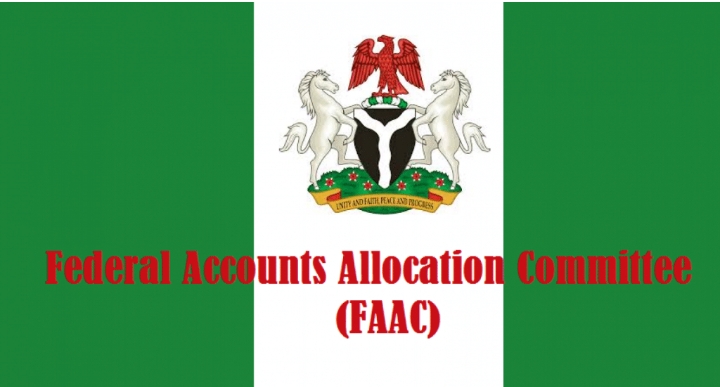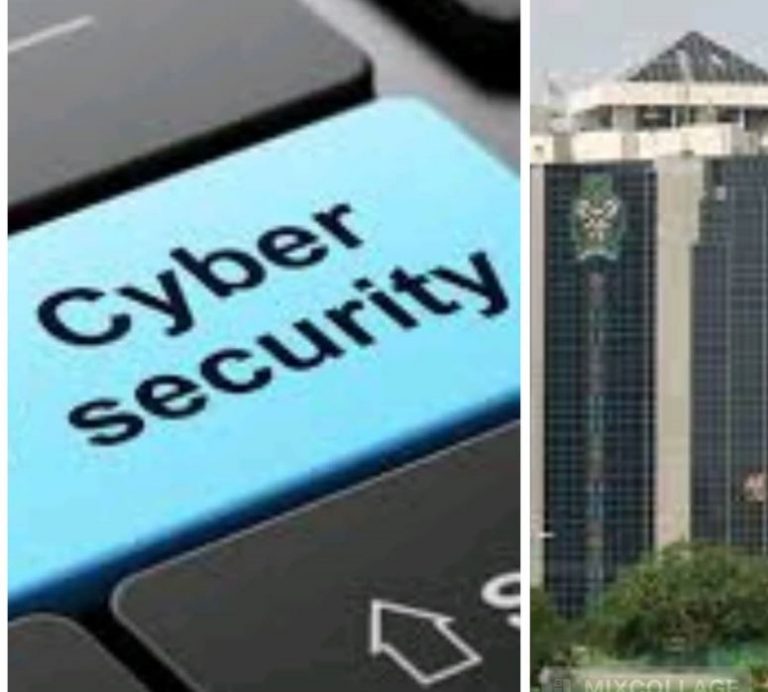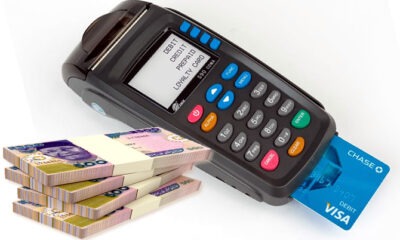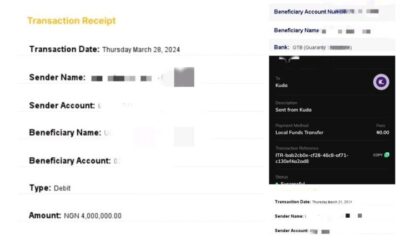Business
FAAC: FG, States, LGAs To Share N725.571bn For Month Of March
Published
2 years agoon
By
Editor
The Federation Accounts Allocation Committee (FAAC), has settled for a sharing formula of N725.571 billion among the three tiers of government, for the month of March 2022.
A statement by Phil Abiawute-Mowete, Director of Information/Press, in the Ministry of Finance, Budget and National Planning, said from the amount, inclusive of Gross Statutory Revenue and Value Added Tax (VAT), the Federal Government received N277. 104 billion, the States received N227.201 billion; the Local Government Councils got N167.910 billion, while the Oil producing states received N53.356 billion as derivation (13% of Mineral Revenue).
The communiqué issued by the Federation Account Allocation Committee (FAAC) at the end of the meeting which was held virtually, indicated that the Gross Revenue available from the Value Added Tax (VAT) for March 2022 was N204.402 billion.
The distribution is as follows; Federal Government got N30.660 billion, the States received N102.201 billion, Local Government Councils got N71.541 billion.
Gross Statutory Revenue of N521.169 billion was distributed according to the communique, from which the Federal Government was allocated the sum of N246.444 billion, States got N125.000 billion, LGCs got N96.369 billion, Derivation (13% Mineral Revenue) got N53.356 billion.
It, however, added that add-backs of VAT for the month for the cost of collection is N8.780 billion, while that of Transfers, Refunds and Savings is N6.322 billion.
The add-backs of Statutory Revenue distributed to the Cost of Collection is N35.631 billion and to Transfers/Refunds/Savings is N376.504 billion.
READ ALSO: Removing 13% Derivation ‘ll Trigger Crisis, Ijaw Warns Northern Lawmakers
The communiqué also revealed that Petroleum Profit Tax (PPT), Oil and Gas Royalties, Import and Excise Duties, Companies Income Tax (CIT) and Value Added Tax (VAT) all recorded tremendous increases.
It was further disclosed that the total revenue distributable for the current month was drawn from Statutory Revenue of N521.169 billion and Value Added Tax (VAT) of N204.402 billion, bringing the total distributable for the month to N725.571 billion.
The balance in the Excess Crude Account as of 27th April 2022 stands at $35.372 million.
You may like


[ICYMI]FULL LIST: 16 Banking Transactions Exempted From CBN’s New


ICYMI: Five Things To Know About The New Cybersecurity Levy To Be Paid By Nigerians


ICYMI: FG Gives Deadline To PoS Operators To Register With CAC


ICYMI: FG To Delist Naira From P2P Platforms


JUST IN: FG Moves To Review Mining License Rates


JUST IN: FG Approves Salary Increase For Civil Servants
Business
[ICYMI]FULL LIST: 16 Banking Transactions Exempted From CBN’s New
Published
24 hours agoon
May 7, 2024By
Editor
The Central Bank of Nigeria on Monday directed all banks to commence charging a 0.5 per cent cybersecurity levy on all electronic transactions within the country.
The apex bank stated this in a circular signed by the Director, Payments System Management Department, Chibuzo Efobi; and the Director, Financial Policy and Regulation Department, Haruna Mustafa; a copy of which was obtained by The PUNCH.
The circular, which was directed to all commercial, merchant, non-interest, and payment service banks, among others; noted that the implementation of the levy would start two weeks from Monday, May 6, 2024.
READ ALSO: Five Things To Know About The New Cybersecurity Levy To Be Paid By Nigerians
“The levy shall be applied at the point of electronic transfer origination, then deducted and remitted by the financial institution. The deducted amount shall be reflected in the customer’s account with the narration, ‘Cybersecurity Levy,’” the circular partly read.
In this piece, The PUNCH highlights all the 16 banking transactions that are exempted from the CBN’s new cybersecurity levy:
Loan disbursements and repayments
Salary payments
Intra-account transfers within the same bank or between different banks for the same customer
Intra-bank transfers between customers of the same bank
Other Financial Institutions instructions to their correspondent banks
Interbank placements,
Banks’ transfers to CBN and vice-versa
Inter-branch transfers within a bank
Cheque clearing and settlements
Letters of Credits
READ ALSO: FG To Delist Naira From P2P Platforms
Banks’ recapitalisation-related funding – only bulk funds movement from collection accounts
Savings and deposits, including transactions involving long-term investments such as Treasury Bills, Bonds, and Commercial Papers.
Government Social Welfare Programmes transactions e.g. Pension payments
Non-profit and charitable transactions, including donations to registered non-profit organisations or charities
Educational institutions’ transactions, including tuition payments and other transactions involving schools, universities, or other educational institutions
Transactions involving bank’s internal accounts such as suspense accounts, clearing accounts, profit and loss accounts, inter-branch accounts, reserve accounts, nostro and vostro accounts, and escrow accounts.
Business
ICYMI: Five Things To Know About The New Cybersecurity Levy To Be Paid By Nigerians
Published
24 hours agoon
May 7, 2024By
Editor
The Central Bank of Nigeria, on Monday, directed banks and other financial institutions to start charging a cybersecurity levy on all banking transactions.
According to the circular sighted by The PUNCH, the implementation of the levy would start in two weeks.
The circular read in part, “Following the enactment of the Cybercrime (Prohibition, Prevention, etc) (amendment) Act 2024 and pursuant to the provision of Section 44 (2)(a) of the Act, ‘a levy of 0.5% (0.005) equivalent to a half percent of all electronic transactions value by the business specified in the Second Schedule of the Act,’ is to be remitted to the National Cybersecurity Fund, which shall be administered by the Office of the National Security Adviser.”
READ ALSO: CBN Orders Banks To Charge 0.5% Cybersecurity Levy
Here are some things to know about the cybersecurity levy to be paid by Nigerians, according to the CBN circular:
1. A new levy of 0.5%, equivalent to half per cent, is applied to electronic transactions as mandated by the Cybercrime (Prohibition, Prevention, etc) (amendment) Act 2024.
2. The levy is paid by the originator of the electronic transaction and deducted by the financial institution. The deducted amount shall be reflected in the customer’s account with the narration: “Cybersecurity Levy.”
READ ALSO: FG To Delist Naira From P2P Platforms
3. Financial institutions will deduct the levy and remit it to the National Cybersecurity Fund administered by the Office of the National Security Adviser.
4. Deductions shall commence within two weeks from the date of the circular, May 6, and financial institutions must remit collected levies in bulk to the NCF account domiciled at the CBN monthly by the fifth business day of the following month.
5. Financial institutions have deadlines to update their systems to handle levy deduction and remittance. Failure to remit the levy can result in penalties, including a fine of up to 2% of a financial institution’s annual turnover.
Business
ICYMI: FG Gives Deadline To PoS Operators To Register With CAC
Published
1 day agoon
May 7, 2024By
Editor
The Corporate Affairs Commission has set a two-month deadline for Point of Sale operators in the country to register their agents, merchants and individuals, latest by July 7, 2024.
The Registrar-General/Chief Executive Officer, CAC, Hussaini Magaji, SAN, met with some fintech companies, also known as PoS, on Monday in Abuja, during which the agreement was reached.
Magaji said the measure aims at safeguarding the businesses of fintech customers and strengthening the economy, the commission stated via its X handle, tweeting as @cacnigeria1.
Magaji stated that the move complies with “Section 863, Subsection 1 of the Companies and Allied Matters Act, CAMA 2020 as well as the 2013 Central Bank of Nigeria’s guidelines on agent banking.”
READ ALSO: CBN Orders Banks To Charge 0.5% Cybersecurity Levy
The tweet partly read, “Hussaini Magaji, therefore, said that the timeline for the registration, which will expire on July 7, 2024, was not targeted at any groups or individuals but genuinely aimed at protecting businesses.
“Several speakers from the fintech industry pledged to collaborate with the Commission to ensure hitch-free implementation of the directive.
“Some of them, however, stressed the need for adequate and collective sensitisation to ensure that the exercise achieved the desired results.”
In his remarks, Tokoni Peter, the Special Adviser to President Bola Tinubu on ICT Development and Innovation, “pledged to ensure the smooth facilitation of the process in line with the Renewed Hope Initiative of the present administration.”
READ ALSO: CBN Orders Banks To Charge 0.5% Cybersecurity Levy
Present at the meeting were representatives of fintech companies, including Opay, Momba, Palm Pay, Moniepoint, Paystack, among others.
Aside from being an avenue for job creation, PoS operators play a significant role in financial transactions nationwide.
The move to compel the registration of the fintech companies with the CAC has come at a much-needed time as the companies have also been a key part of fraudulent transactions.
READ ALSO: Pandemonium During Church Service As Man Pulls Gun, Attempts To Shoot Pastor [VIDEO]
In its Annual Fraud Landscape (January to December 2023) report, the Nigeria Inter-Bank Settlement System has said that financial institutions lost about N17.67 billion to fraud in 2023.
It was also reported that the Web and PoS channels were the most exploited payment channels by fraudsters in 2023.
The count of Web Fraud decreased by 38 per cent and ATM fraud recorded a 64 per cent reduction from 2022 to 2023.

‘I’m Considering Having 4th Child’ – Mother Of Three Who Breastfeeds Husband , 3 Kids [PHOTOS]

VIDEO Newly Appointed LG Supervisors, Advisers In Ekiti Take Oath Of Office With ‘Ogún’

JUST IN: DSS Arrests Wanted Oyo Motorpark Boss, Auxiliary
Trending

 News5 days ago
News5 days ago15-year-Old Public School Student Scores 362 In UTME

 Headline3 days ago
Headline3 days agoPHOTOS: Moment 23-year-old Miss Ecuador Beauty Queen Is Gunned Down In Hail Of Bullets

 Metro2 days ago
Metro2 days agoKidnappers Sleep Off After Abducting Pastor’s Wife, Others In Ondo

 News3 days ago
News3 days agoJUST IN: SERAP Drags 36 Govs, Wike To Court Over N5.9tn, $4.6bn Loans

 Headline4 days ago
Headline4 days agoShock As Woman Who Visited Hospital For Scan Was Told She’s Dead

 Metro2 days ago
Metro2 days agoMan Dies On Top Of Married Woman In Akure

 Headline3 days ago
Headline3 days agoVIDEO: Arsenal Pay Tribute To 14-year-old British-Nigerian Fan Daniel Anjorin Killed In UK

 Headline3 days ago
Headline3 days agoFind The Man Who Stole $30000 From Me, Get $2000 Reward – Nigerian Man Cries Out

 Headline1 day ago
Headline1 day agoICYMI: Pandemonium During Church Service As Man Pulls Gun, Attempts To Shoot Pastor [VIDEO]

 Metro4 days ago
Metro4 days agoDelta Lady Dies After Friends Allegedly Pushed Her Into Pot Of Boiling Pepper [Photos]





































